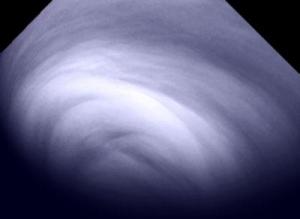Venus’ weather ‘not boring at all’ as previously believed
 Washington, Sept 28 : The climate on Venus at more than 800 degrees Fahrenheit under a suffocating blanket of sulfuric acid clouds is widely known to be unpleasant - but that's not so, say US astronomers.
Washington, Sept 28 : The climate on Venus at more than 800 degrees Fahrenheit under a suffocating blanket of sulfuric acid clouds is widely known to be unpleasant - but that's not so, say US astronomers.
While it is true that the planet's surface has a crushing atmosphere more than 90 times the pressure of Earth''s, a new study of old data by NASA and international scientists suggests that higher up, the weather gets
more interesting.
"Any variability in the weather on Venus is noteworthy, because the planet has so many features to keep atmospheric conditions the same," says Dr. Tim Livengood, a researcher with the University of Maryland.
"Earth has seasons because its rotation axis is tilted by about 23 degrees, which changes the intensity of sunlight and the length of the day in each hemisphere throughout the year," he said.
"However, Venus has been tilted so much, it''s almost completely upside down, leaving it with a net tilt of less than three degrees from the sun, so the seasonal effect is negligible," he added.
Inspite of this, variable weather does exist in the planet, researchers said.
Telescopic observations of Venus in infrared light at about 68 miles (110 kilometers) above the planet''s surface, in cold, clear air above the acid clouds, in two layers called the mesosphere and the thermosphere,
showed the planet does, in fact, have interesting weather.
"The mesosphere and thermosphere of Venus are dynamically active," said lead author Dr. Guido Sonnabend of the University of Cologne, Germany.
"Wind patterns resulting from solar heating and east to west zonal winds compete, possibly resulting in altered local temperatures and their variability over time."
Although Venus is often referred to as Earth''s twin, since they are almost the same size, it ended up with a climate very different from Earth.
A deeper understanding of Venus'' atmosphere will let researchers compare it to the evolution of Earth''s atmosphere, giving insight as to why Earth now teems with life while Venus suffered a hellish fate, say
astronomers.
The study has been published in the journal Icarus. (ANI)